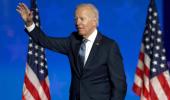The beauty of the relationship between the two countries is that they agree to disagree and perhaps that is the strongest bond between the two governments and their relationships, notes Rup Narayan Das.

The air of uncertainty and with regard to the US election is now over with Joe Biden being declared elected for the Oval Office.
There has been some anxiety in India, as elsewhere in the world, as to what would be its impact on the bilateral relationship between the two countries.
Suffice to say the aphorism there is no permanent friend or permanent enemy, it is only permanent interest and this is going to determine the India-US relationship.
Joe Biden is no stranger to India.
Having been associated with the India-US nuclear deal from the very beginning, he followed India very closely for a fairly long time.
The then senator Biden had visited India way back in February 2008 accompanying then senator John Kerry, the then chairman of the US Senate Committee on Foreign Affairs along with then senator Chuck Hagel to discuss the situation in Afghanistan and had a discussion with then pime minister Dr Manmohan Singh.
Beside Afghanistan, the delegation, as expected, also discussed the India-US nuclear deal.
As Sanjay Baru recalls in his book Accidental Prime Minister after meeting Dr Singh Biden told the media waiting outside 7RCR, 'A number of senators are prepared to vote (for the 123 Agreement) though they don't think it is good as it should have been'.
Their reluctance on substance, said Biden, 'was overcome by their belief in the India-US relationship.'
The India-US nuclear deal is the eloquent testimony of the bipartisan support of the political mainstream of the two countries.
Not to be forgotten that the historic nuclear deal which ended what India's foremost strategic thinker K Subramanyam called India's 'nuclear apartheid' was initiated by then prime minister Atal Bihari Vajpayee leading the NDA regime and was brought to fruition by Dr Manmohan Singh leading the UPA regime who quipped looking at the former, 'I have only completed what you began.'
While the nuclear deal enjoyed bipartisan support in the US Congress, the role Joe Biden played will always be remembered.
Biden, who in 2005 was chairman of the powerful Senate Foreign Relations Committee, played a pivotal role in the Congressional passage of the civil nuclear deal.
On July 18, 2005, then US president George W Bush announced that he would work to achieve full civil nuclear energy cooperation with India and would also seek agreement from the US Congress to adjust US policy in the context of a broader global partnership with India in order to promote stability, democracy and peace.
The passage of the nuclear deal, also known as the 123 Agreement in the House of Representatives and Senate Foreign Relations Committee ,was unprecedented demonstrating bipartisan legislative support in the US Congress.

Delivering the key note address at a dinner hosted jointly by the Confederation of Indian Industry and the Carnegie Endowment for International Peace, a top US think-tank, to celebrate the tenth anniversary of the signing of India-US civil nuclear deal in July 2015, then vice president Joe Biden said the deal was imperative 'not only for the sake of our two nations, but also for the sake of the region and the world- a lot depends on this relationship.'
Recalling his role ten years ago he said, 'I had the honour of-because of my position as Chairman of the Committee the leading Senate in an effort to ratify, the US-India civilian nuclear agreement, and it helped in my view, to remove the single largest irritant between the two of the world's greatest democracies.'
There is no denying, Biden added, that 'the execution of this visionary accord took tremendous courage and diplomatic outreach in capitals all over the world.'
He further observed, 'It required us to break entrenched orthodoxies to achieve something that in retrospect was long overdue. The US Senate's bipartisan cooperation was at a moment of deep bipartisan divide, but it united a Republican President (George W Bush) and a Democratic Congress to get behind a common goal.'
India, he said, was also 'an essential part of the US rebalancing strategy toward the Asia-Pacific, and articulated, the US and India, could 'lead as much as by the power of example as by the example of our power.'
Such being his disposition towards India, it can be reasonably certain that there will be continuity with change.
In fact, the strategic edifice of the Indo-Pacific is likely be further strengthened with Biden in the Oval Office.
The relationship between India and the US is not constrained by political regime in the two countries.
Irrespective of regime change, the two countries over the last few years have witnessed change with continuity in the bilateral relationship between the two countries.
The multi-layered relationship is driven not only by shared values, but also to put it pragmatically by shared interest, not necessarily transactional.
Look at the ubiquitous Indian Diaspora which is palpable in the US landscape.
Indian students and the academic faculty dot US universities and the Indian community operates a good number of start-ups; the business between the two countries is surging year by year; not to mention India's defence procurement to face the threat to its sovereignty and territorial integrity.
It has truly reached a win-win situation.
The beauty of the relationship between the two countries is that they agree to disagree and perhaps that is the strongest bond between the two governments and their relationships.
Rup Narayan Das, PhD, is a China scholar and currently a senior fellow at the Indian Council of Social Science Research at the Indian Institute of Public Administration, New Delhi.
Feature Presentation: Aslam Hunani/Rediff.com










